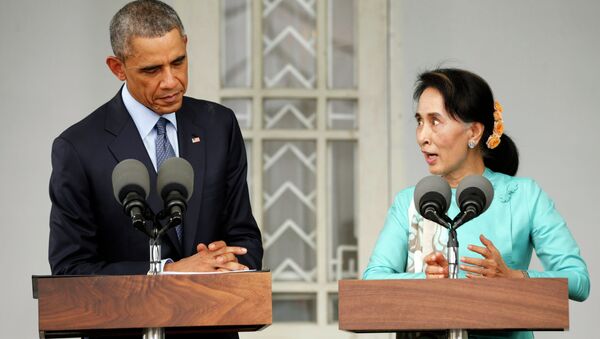MOSCOW, November 14 (Sputnik) — US President Barack Obama met with Myanmar opposition leader Aung Sang Suu Kyi at her lakeside villa in Yangon on Friday, commenting on the country’s need to speed the pace of its political and economic reform efforts.
Obama, who has invested a great deal of political capital in Myanmar’s transition from a military-led government to a democratic, constitutional republic, told reporters at a joint press conference with Ms. Suu Kyi that while the country’s progress toward reforms have been positive, they are “by no means complete or irreversible.” He also urged “free, fair and inclusive” elections, set for late next year.
For her part, Suu Kyi noted that she believes the “reform process is going through a bumpy patch,” but added that “this bumpy patch is something we can negotiate with commitment and the help and understanding of our friends around the world.”
Making clear that she was speaking about the need for continued US assistance in pressuring the current government, Suu Kyi noted that “when Burma becomes a fully functioning democracy in accordance with the will of the people, we will be able to say that among those friends who enabled us to get there, the United States was among the first.”
The two Nobel Peace Prize laureates conducted the joint press conference at Suu Kyi’s family home, where she had been held under house arrest for over 20 years before being released four years ago and elected to Myanmar’s parliament in a by-election in 2012. Obama’s meeting with Suu Kyi on Friday follows meetings he held yesterday with Myanmar’s President Thein Sein and legislative leaders in Naypyitaw, and is thought to be as close as possible to an endorsement that the president can offer the 69-year-old activist. APF analysts expect Suu Kyi’s National League for Democracy to sweep the elections set to take place late next year.
Obama and Suu Kyi jointly condemned the fact that the latter was barred from running for office next year due to a clause in the country’s pre-reform era constitution. The constitution notes that citizens with close ties to foreign nationals are barred from running for the presidency. Suu Kyi’s children and late husband are British, and she considers this a measure aimed specifically against her. "From the point of view of democracy, it is not right to discriminate against one particular person," she said, adding that “the majority of our people understand that this constitution cannot stand as it is.”
Obama backed up Ms. Suu Kyi, noting that "I don't understand a provision that would bar somebody from running for president because of who their children are," adding that the legal provision “doesn't make much sense to me.”
The meeting today follows Obama’s meeting with Sein on Thursday, where the president mixed praise for reforms with criticisms of what he perceives as a stalled effort. “The democratization process in Myanmar is real,” Obama noted, “but in our discussions, we recognized that this process is still incomplete.” He pressed Mr. Sein on elections, noting that “we expect elections to take place on time.”
The Obama administration has been critical of a clause in the constitution which reserves 25 percent of the seats in the country’s parliament for the military, which includes the right of veto power over constitutional changes. Obama has also voiced concerns about limits to freedom of expression, and the treatment of the country’s minorities, especially the Muslim Rohingya.
President Obama noted in his press conference with Suu Kyi that “discrimination against the Rohingya or any other religious minority, I think, does not express the kind of country that Burma over the long term wants to be,” adding that it would be “destabilizing to a democracy.” The New York Times has explained that Myanmar’s continued persecution of the 1.1 million minority group “is the biggest international blot on Myanmar’s reputation,” adding that the country’s politicians’ failure to address the issue “could deprive the country of support in the West.”
Suu Kyi, whose National League for Democracy party faces good prospects for the 2015 elections, was notably quiet on this issue, possibly fearing a loss of support from her country’s predominantly Buddhist constituents. Speaking broadly, without mentioning the Rohingya by name, Suu Kyi said only that “it is a duty of the government to make all our people feel secure” and that the country’s people must “learn to live in harmony.” Politicо researcher Adam Lerner noted that the plight of the Rohingya is something the prospective president “would probably prefer to ignore.”
The Rohingya, who live in the western state of Rakhine, face apartheid-like conditions; nearly 140,000 currently live in temporary encampments following clashes with ethnic Rakhine Buddhists which expelled them from their homes in 2012, Reuters has explained. Many Buddhists consider the Rohingya to be interlopers from neighboring Bangladesh, despite the fact that the Rohingya have lived in the region for generations.
Obama’s response to Myanmar’s democratization efforts over the last years has included the end of US sanctions, which has returned foreign investors to the country, along with diplomatic concessions, including the holding of this year’s Association of Southeast Asian Nations (ASEAN) meeting in the country.


